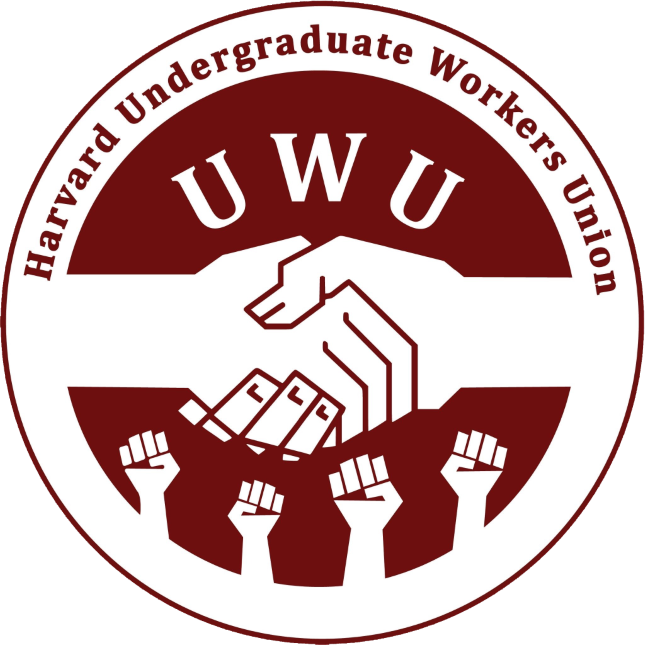My name is Lee Kennedy-Shaffer—I marched with striking student workers from University Hall to 114 Mt. Auburn Street to facilitate a bargaining session for the first time since our strike began. The administration’s bargaining committee had to walk through a tunnel of student workers to enter the building.
Yesterday the administration demonstrated more willingness to seriously bargain than they had up until this point. We also heard something we have not heard from the administration since bargaining began—that both parties at the table have a mutual interest in reaching an agreement. We are hopeful that the administration will confirm further dates for an accelerated pace of bargaining prior to the start of the next semester.
We reached six new tentative agreements—three that we signed at the table and three more that we expect to sign over email. Additionally, the administration made conceptual advances on pay stability in the case of under-enrolled classes and funds for offsetting the cost of copays. Despite this progress, the administration responded to our comprehensive economic package with only modest improvements to existing proposals on healthcare and compensation (details below), and their responses do not satisfy our core demands.
We need to maintain pressure to win fair pay, affordable healthcare, and protections against harassment and discrimination. The strike continues as we head into winter break.
You can call the administration every day to make sure they keep their word and return to the table with substantive proposals. For all strikers, this one ask will be our virtual picket line for this week: Use this form to do your strike duty this week.
Core demands remain unaddressed: Compensation, Health Benefits, Nondiscrimination
It’s disappointing that the university once again did not walk in with substantive changes or a pathway to a contract on compensation, healthcare, and protections against harassment and discrimination. Upon considering our most recent comprehensive package for two weeks, the administration proposed the following financial improvements to their previous proposals:
- Dental Coverage: $0 improvement
- Dependent Insurance: $0 improvement
- Compensation: 0.1% increase in raises (from 2.5% to 2.6%) for salaried workers; $1 increase for hourly wage minimum ($16). The university still refuses to negotiate over total compensation for TFs in many programs.
- Pay stability: For the first time, the University proposed that SWs who have their TF appointments rescinded due to under-enrollment should get 10% of the compensation they would have received. This isn’t enough, but it’s a sign that the administration is finally taking concerns about pay/appointment security seriously.
- Creation of a copay fund: $100,000/year. The university suggested that student workers could draw on this fund to offset payments to offset mental health copays, but they once again rejected year-round mental healthcare and lifting the cap on specialist visits.
- Childcare Fund: $25,000 increase (to $325,000/year)
These minor improvements are not sufficient to settle this contract. Instead of hiring more lawyers or overtime police officers, the university should invest money in student workers.
Three signed tentative agreements — Housing, Titles & Classifications, Emergency Grant
We agreed to a side letter to the contract that allows student workers on Harvard Housing to pay for their rent monthly without incurring additional fees. We reached a tentative agreement on Titles & Classifications, a key component of the framework for raising everyone’s rates and ensuring people don’t lose pay due to misclassifications. We also secured an Emergency Grant, a fund administered by our union to support our members financially through emergency situations.
Three expected tentative agreements—Discipline & Discharge, Grievance & Arbitration, No Strike/No Lockout
Our article on Grievance & Arbitration establishes a procedure by which violations of our contractual rights can be taken to a neutral, third-party arbitrator for resolution. This article does not address the grievability of harassment and discrimination, which is covered in a separate article. The University still maintains that complaints of harassment and discrimination should be carved out of the contract. The article on No Strike – No Lockout bars the administration from locking us out of our workplace, of the places where we advance our degrees, in exchange for our union not sanctioning strikes once our full contract is in effect. This is a common provision in union contracts, and it doesn’t impact our ongoing strike as we fight for a fair contract. The article on Discipline & Discharge ensures that student workers can only be disciplined or dismissed for “just cause.” It also ensures that student workers will have access to union representation and a fair process in the event that they are disciplined at work. These articles, taken together, advance our rights and establish clear protections.
It is clear the administration is feeling the pressure of our strike. We are proud of the union we are building throughout this time, as we hear each other’s stories, stand together with each other and our supporters on the picket lines, and stay strong while the administration tries to intimidate us into backing down from the rights and protections we deserve. Today, our alumni joined the contract fight by holding actions in four cities. We will continue to pressure the administration in many ways until we get a fair contract. One day longer, one day stronger.
Solidarity,
Lee Kennedy-Shaffer
4th-year PhD student in Biostatistics
Harvard T.H. Chan School of Public Health
Bargaining Committee Member


